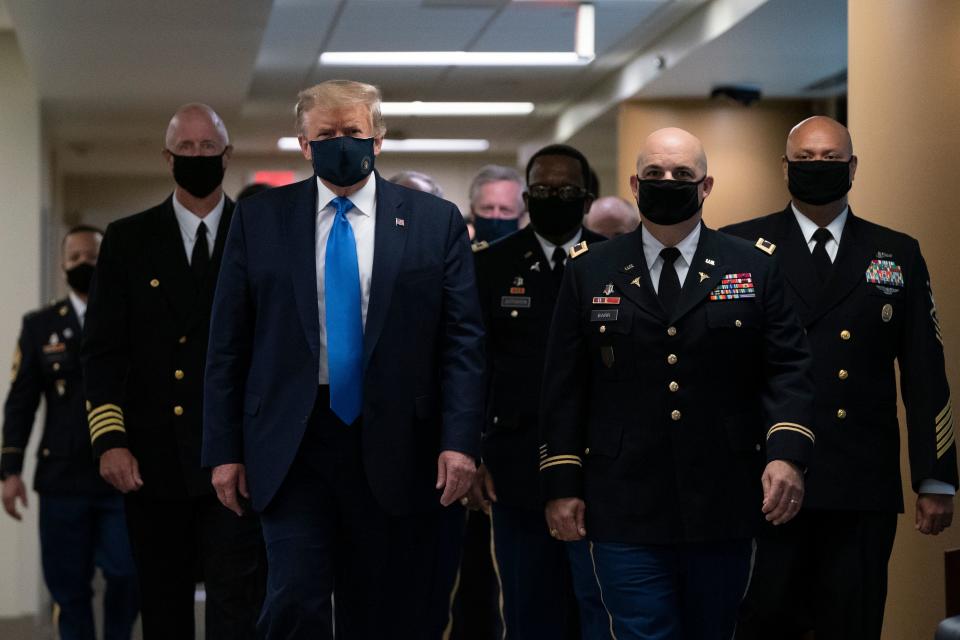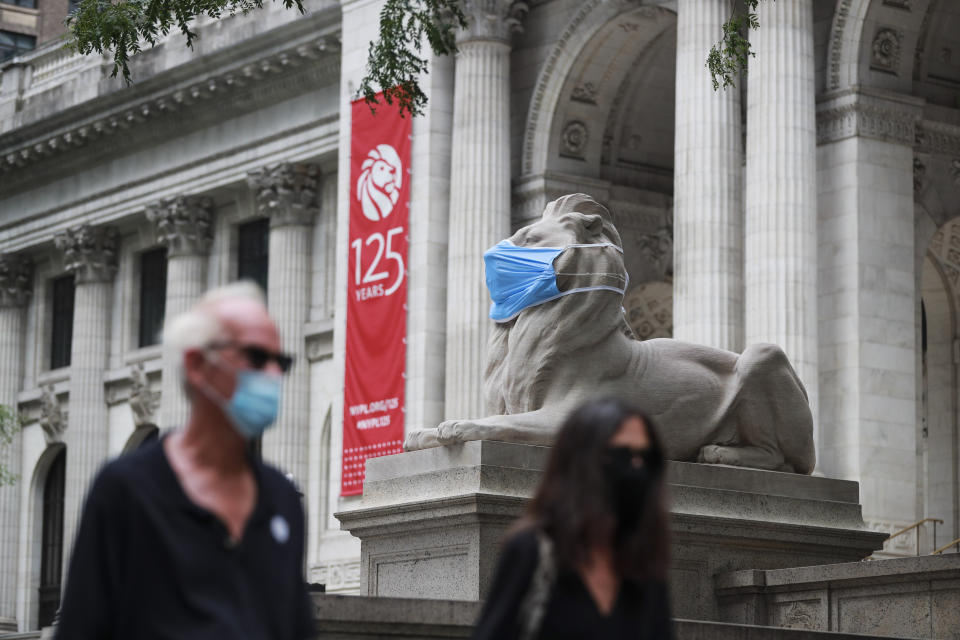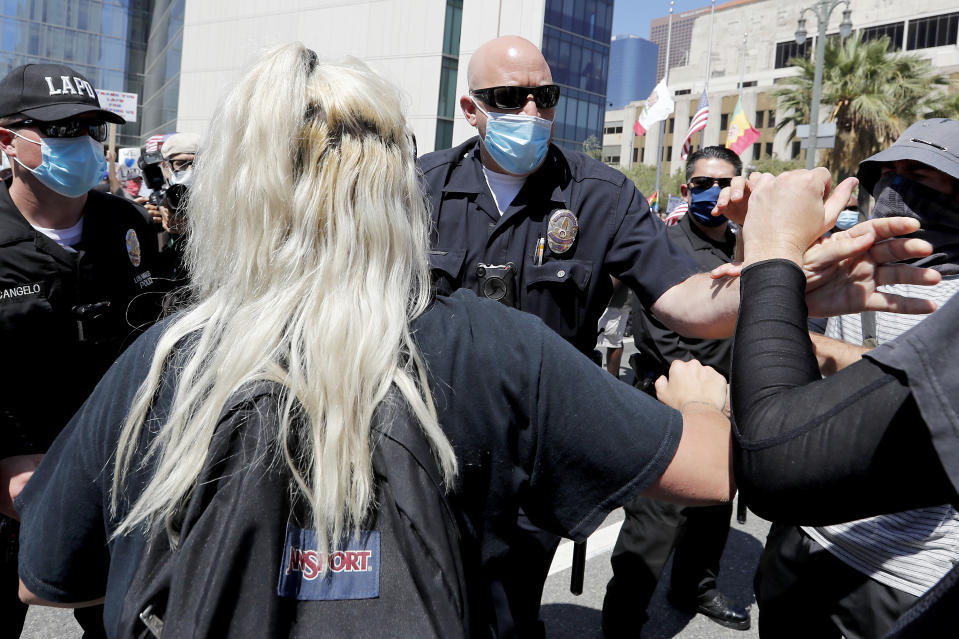States issue mask mandates, but can they make them stick?
Even before the Centers for Disease Control and Prevention called on Tuesday for all Americans to wear masks as a “civic duty,” a number of governors were taking matters into their own hands, imposing requirements for face coverings in indoor (and some outdoor) public spaces.
But enforcement, in the hands of local authorities who may be confused, uninterested, or politically or philosophically opposed — or just have what they consider more important law enforcement priorities — is spotty, and compliance is hard to measure.
Concern over rising cases and deaths recently prompted the governors of Alabama, Kentucky and Louisiana to join more than a dozen other states that have some form of a statewide mask mandate.
“Cases in Louisiana continue to increase, including setting a record-high number of new cases reported in one day, today and yesterday,” Gov. John Bel Edwards said in a July 11 statement. “More than two thousand new COVID infections reported each of these days and increased hospitalizations are signs that we continue to go in the wrong direction in our work to control COVID-19 in our state.”

As masks become a requirement across the country, enforcement remains a sticking point. There appears to be little consensus among elected leaders and law enforcement officials on how to best implement and uphold such orders, with some local governments threatening fines and jail time, while police agencies question their role in enforcing the orders.
“These executive orders are as clear as mud,” said Brian Higgins, a former police chief and public safety director in Bergen County, N.J., and an instructor at John Jay College of Criminal Justice. “They’re not very definitive.”
Like Edwards, other state leaders who were slow to issue such mandates eventually did as cases in their states increased. Even two holdouts, Florida and Arizona, among the hardest-hit states, have allowed local officials to enact measures that require masks.
“I’d hoped that we wouldn’t have to get to a point where we mandated things,” said Kentucky Gov. Andy Beshear at a July 9 news conference. “I’d hoped that we’d all be willing to do the right thing. But I think that the amount of time that we dealt with this, our anxiety, cabin fever, all of it added up. It’s time to get serious.”
The mandates come as the number of coronavirus cases in the U.S. exceeds 3 million, according to data from Johns Hopkins University. Deaths have climbed to more than 135,000.
Experts have long touted face coverings as an effective way to curb transmission of COVID-19.
“It’s not practical for everybody to be tested every day, and to track the spread of the virus that way,” Dr. Anne Liu, an infectious disease physician at Stanford Health Care, told Yahoo News. “And, short of physically distancing, until we have another solution out of this situation, mask wearing has to be the new normal.”
Dr. Robert Redfield, director of the CDC, urged people Tuesday to wear masks to help efforts against the disease.
Many governors now aim to make wearing masks in public universal. Michigan Gov. Gretchen Whitmer signed an executive order last week in response to rising COVID-19 cases in her state. The order, which took effect on Monday, requires face coverings in indoor public spaces and crowded outdoor spaces. It also requires, with some exceptions, businesses to refuse entry or service to people who don’t have one.

“Masks can reduce the chance of spreading COVID-19 by about 70 percent,” Whitmer said in a news release. “By wearing masks, we can save lives and protect our family, friends, and neighbors from the spread of COVID-19.”
The order says businesses in violation of the order could face a license suspension. Individuals who violate the order face a misdemeanor charge and a fine of up to $500, but no jail time.
The mandate was met with indifference from local police agencies. Van Buren County Sheriff Daniel Abbott told MLive that his office will not investigate mask complaints. Abbott later said on Facebook that the legality of Whitmer’s executive orders that have been issued are “in question,” and that his office will respond to mask-related incidents that become disorderly.
Another Michigan police official, Arenac County Sheriff James Mosciski, had a similar response. “We do not have the manpower to respond to mask violations,” he said Monday on Facebook, directing residents to the Michigan Occupational Safety and Health Administration or the attorney general.
The responses illustrate an ambivalence from some law enforcement officials over their role, if they indeed have one, in enforcing the orders.
“It should never be the police that are enforcing this,” Higgins told Yahoo News, adding that unlike state laws that usually codify and lay out rules and penalties clearly, the executive orders are muddled, and also mired in legal opposition.
Whitmer, in her most recent order, said challenges to three of her earlier executive orders related to the pandemic are pending. After Beshear’s order, the Kentucky attorney general’s office filed a motion asking a judge to consider whether it complies with a temporary restraining order against enforcement of COVID-19 executive orders that conflict with or go beyond state law. (The Kentucky attorney general, Daniel Cameron, is a Republican; Beshear is a Democrat.)

Police, Higgins said, should be the last resort in mask-related incidents. He said he believes more businesses should have mask mandates, but acknowledged the difficulty of dealing with resistance.
“Some of these situations have turned violent,” Higgins said, referring to incidents in which people have gotten upset over being asked to wear masks to enter businesses, many of which have forbidden entry without a face covering. “That’s when the police should be called. But I think we need to focus more on getting the word out about how serious [coronavirus] is.”
Walmart and Sam’s Club announced Wednesday that starting July 20, shoppers at their stores will be required to wear face coverings.
“While we’re certainly not the first business to require face coverings,” company officials said in a blog post, “we know this is a simple step everyone can take for their safety and the safety of others in our facilities.”
Apart from enforcement, health experts told Yahoo News that the punishments attached to the mandates are likely to do the opposite of what state officials are trying to accomplish.
“The best approach is one that really focuses on education and trying to convince people to voluntarily comply,” Alex McCourt, an assistant scientist at the Johns Hopkins Bloomberg School of Public Health, told Yahoo News. “That’s likely to be more effective than something that is very harsh.”
Strict fines and jail time, McCourt said, can add to the distress people are already facing due to COVID-19.
“You don’t want people crowding in jails and being arrested and forced into these environments,” he said. “And we don’t want anyone to be suffering economically either.”
Liu also doubted the efficacy of mandates, saying there has to be a cultural acceptance of face coverings as the norm.
“Other public health measures have demonstrated that education and encouragement and a shared culture around change that we hope [will] happen is more effective than dictums and decrees,” she said. “Generally, I think there needs to be a more unified message on a national as well as a local level.”
This involves officials leading by example. President Trump wore a mask in public for the first time at Walter Reed National Military Medical Center on Saturday, the Associated Press reported, a move that McCourt said is important because it demonstrates that mask-wearing is beneficial.
“However, I think that this was just one instance,” he said. “His language and his behavior that he’s been demonstrating for months has kind of shown the opposite. That he’s not in favor of mask-wearing and he doubts its efficacy. I think this one example is great, and I hope he continues to do it.”
_____
Read more from Yahoo News:
Cover thumbnail photo: Al Bello/Getty Images



